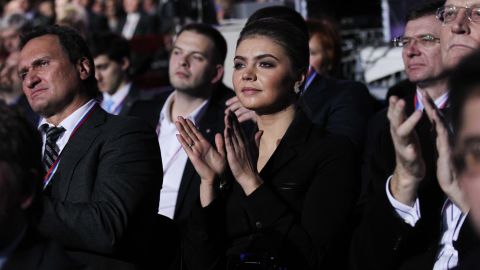CNN
—
Alina Kabaevaa woman who had a romantic relationship with the Russian president Vladimir Poutineis included in the sixth proposed EU sanctions package against Russia for its invasion of Ukraine, according to two European diplomatic sources.
At this point, names can be removed or added at the discretion of member states and should be a point of negotiation when a new sanctions package is proposed, a European Commission source told CNN.
The EU has not officially endorsed the draft proposal.
” Discussions are ongoing. It’s not a piece of cake, but we have to wait and see,” one of the diplomatic sources told CNN on Friday morning.
CNN has reached out to Russia’s national media group, of which Kabaeva is the head, to comment on the proposed sanctions.
Kabaeva, who was born in 1983, was first linked to Putin more than a decade ago when she was a medal-winning gymnast. Putin, who is divorced, denied a relationship with her.
In April, the Wall Street Journal reported that US officials debated whether to impose sanctions on Kabaeva, fearing that such a move could further increase tensions as it could be an extreme personal blow to Putin.
The head of the Russian Orthodox Church, Patriarch Kirill, is also among those targeted by the EU’s proposed sixth round of sanctions, according to two sources who have seen the full documents.
The proposed sanctions do not correspond to “common sense”, Russian Orthodox Church spokesman Vladimir Legoida said on Wednesday, according to Russian state news agency TASS.
“The blinder (these) sanctions become, the more they lose touch with common sense and the more difficult it becomes to achieve peace, which the Russian Orthodox Church prays for at every service with the blessing of His Holiness the Patriarch,” said Legoida. said in a Telegram post.
“Only those who are completely ignorant of the history of our Church can seek to intimidate its clergy and believers by compiling lists,” Legoida said.
The EU has intensified its economic action against Russia since the start of the war in Ukraine. More recently, the block has proposed a ban on Russian oil importssomething that would have a major impact on the Russian economy, although Hungary, an EU member state with close ties to Putin, is likely to sabotage such plans.
Kabaeva and Putin reportedly met when she was a young gymnast, who won several medals at national level, in European competitions and at the Olympics. She received the gold medal in rhythmic gymnastics at the Athens Games in 2004.

Widely known in her home country, she was chosen as one of the torchbearers when Russia hosted the Winter Olympics in Sochi, Russia in 2014, an event that took place shortly before Russia illegally annexed Ukraine’s Crimean peninsula.
Kabaeva has made public statements in support of the Russian military since the start of the war in Ukraine, more recently calling on Russian citizens to rally behind the war effort.
At a recent gymnastics event, she said, “Every family has a war story, and we shouldn’t forget that. We should pass it on from generation to generation.
According to the Wall Street Journal, US officials say she and her family have to become rich due to his closeness to Putin, although the Kremlin continues to deny any relationship between the two. The US Treasury Department declined to comment on the matter.
Regardless of her actual relationship with the Russian president, if her name appears on the final EU sanctions list, Kabaeva – still relatively unknown outside Russia – and her finances will come under intense international scrutiny.